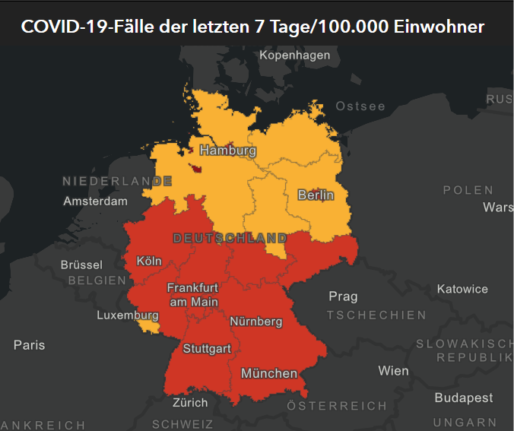Is Germany set for a spike in Covid cases this autumn?

Covid numbers in Germany have been falling again over the past few weeks - but the Robert Koch Institute expects that to change this autumn.
In its weekly report, Germany's public health authority revealed that it expects the period of calm in the pandemic to come to an end in the near future.
Though almost two-thirds of the population, and three-quarter of adults, are now fully vaccinated, the Robert Koch Institute (RKI) said the large number of people who are still unvaccinated and an increase in socialising indoors are likely to drive infections up once more when the weather becomes wetter and cooler.
Its assessment matches that of the EU health authority ECDC, which has recently warned of a worsening Covid situation in Europe this autumn due to insufficient vaccination rates.
For several weeks, however, Covid infections have been falling in Germany, causing some to question whether Germany had managed to break the impending fourth wave.
READ ALSO:
- What’s behind the falling Covid cases in Germany?
- Covid resurgence likely to hit Germany in October, warns top virologist
According to the RKI, this could be down to fewer people travelling abroad, the slow but steady increase in vaccination coverage, the mild weather in many regions and measures such as '3G' and '2G', which require people to show proof of immunity or a negative test to enter indoor spaces.
Nevertheless, the downward trend has gradually started to reverse over the past few days. Currently, the 7-day incidence per 100,000 people stands at 64.3 nationwide - up slightly from 63 on Thursday and 62.5 on Friday last week.
Here's the situation at a glance:
Most cases among the young
According to the reporting data, the virus is particularly prevalent among children from pre-school age and adolescents up to 19 years of age - the vast majority of whom are unvaccinated.
The RKI recorded the highest 7-day incidence of all age groups for 10-14 year-olds, with 168 infections per 100,000 people in that age-group in the past week. Children between the ages of five and nine follow closely behind with a weekly incidence of 139 per 100,000 people.
... Vakzinangebots.
Auffällig außerdem: Nicht weniger als 29% der neuen Fälle waren gestern unter 15 Jahre alt - ein neuer Rekordwert. pic.twitter.com/tYPKt40y3G
— Olaf Gersemann (@OlafGersemann) October 1, 2021
So far, vaccination against Covid-19 has only been possible for people aged 12 and over - though Pfizer/BioNTech has recently run successful trials on younger children in which they administered their existing vaccine at a lower, more age-appropriate dose.
READ ALSO: When will children in Germany be offered a Covid vaccine?
In the groups of the population aged 60 and over, where just over 84 percent of people are vaccinated, the 7-day incidence is consistently below 50.
Different trends in different states
Looking at the regional developments, there are exceptions to the overall downward trend. Last week, the number of cases decreased in almost all federal states compared to the previous week, but in Saxony and Mecklenburg-Western Pomerania, slight increases of four and eight percent, respectively, were recorded.

The weekly incidence of Covid cases per 100,000 people in different German states. States in red have an incidence of more than 50 cases per 100,000 people each week. Source: RKI
Currently, the state with the highest 7-day incidence is Bremen, with 121 cases per 100,000 residents, followed by Bavaria, with 87.8, and Baden-Württemberg, with 82.4.
The states with the lowest 7-day incidence, meanwhile, are Schleswig-Holstein, with 29.1 weekly cases per 100,000 residents, Brandenburg, with 38.5, and Saxony-Anhalt, with 42.1.
Talking on the Coronavirus Update podcast on NDR-Info on Tuesday evening, virologist Christian Dorsten said the rise in infections in some eastern states is an indication of what could soon happen elsewhere.
“I think there is now an indication of the autumn and winter wave that we will probably see again in October," he said.
Hospitals and ICU wards
According to the RKI, most hospital admissions are currently involving people in the middle age group (35 to 59 years), and the overall trend is downwards.
With regard to the situation in intensive care units, the RKI says that the number of people diagnosed with Covid-19 and ending up on ICU wards had plateaued slightly in recent weeks.
More than 1,300 people are currently in intensive care with Covid. As of Friday, the number of daily Covid-related deaths had risen to 74.
Most people back at work
The influence of summer holidays has now clearly diminished, leading to a slight dampening in infection rates as fewer people return from tourist (and Covid) hotspots like Greece and Spain.
However, that also means that - back at the office and in school - a higher proportion of people are catching Covid here rather than abroad.
"Infection is increasingly taking place within Germany," writes the RKI.
More testing, fewer positive samples
For some weeks now, significantly more tests have been carried out in the laboratory in Germany than in the summer.
The proportion of positive samples has now fallen again: according to the report, it was 6.4 percent last week, compared to 7.5 percent the week before.
Hygiene measures playing a role
Hygiene measures and vaccination have reduced the number of outbreaks in nursing homes and medical facilities, the RKI tweeted on Thursday.
Durch Hygienemaßnahmen & #Impfung ist die Zahl der #COVID19 Ausbrüche in Alten- und Pflegeheimen & medizinischen Einrichtungen gesunken. Diese Maßnahmen sind im Herbst/Winter zum Schutz der Menschen dort weiterhin entscheidend.
Neuer #Wochenbericht➡️https://t.co/mtCB353YSo pic.twitter.com/WsAhRBnAaF
— Robert Koch-Institut (@rki_de) September 30, 2021
"These measures remain crucial in autumn and winter to protect people there," they warned.
Comments
See Also
In its weekly report, Germany's public health authority revealed that it expects the period of calm in the pandemic to come to an end in the near future.
Though almost two-thirds of the population, and three-quarter of adults, are now fully vaccinated, the Robert Koch Institute (RKI) said the large number of people who are still unvaccinated and an increase in socialising indoors are likely to drive infections up once more when the weather becomes wetter and cooler.
Its assessment matches that of the EU health authority ECDC, which has recently warned of a worsening Covid situation in Europe this autumn due to insufficient vaccination rates.
For several weeks, however, Covid infections have been falling in Germany, causing some to question whether Germany had managed to break the impending fourth wave.
READ ALSO:
- What’s behind the falling Covid cases in Germany?
- Covid resurgence likely to hit Germany in October, warns top virologist
According to the RKI, this could be down to fewer people travelling abroad, the slow but steady increase in vaccination coverage, the mild weather in many regions and measures such as '3G' and '2G', which require people to show proof of immunity or a negative test to enter indoor spaces.
Nevertheless, the downward trend has gradually started to reverse over the past few days. Currently, the 7-day incidence per 100,000 people stands at 64.3 nationwide - up slightly from 63 on Thursday and 62.5 on Friday last week.
Here's the situation at a glance:
Most cases among the young
According to the reporting data, the virus is particularly prevalent among children from pre-school age and adolescents up to 19 years of age - the vast majority of whom are unvaccinated.
The RKI recorded the highest 7-day incidence of all age groups for 10-14 year-olds, with 168 infections per 100,000 people in that age-group in the past week. Children between the ages of five and nine follow closely behind with a weekly incidence of 139 per 100,000 people.
... Vakzinangebots.
— Olaf Gersemann (@OlafGersemann) October 1, 2021
Auffällig außerdem: Nicht weniger als 29% der neuen Fälle waren gestern unter 15 Jahre alt - ein neuer Rekordwert. pic.twitter.com/tYPKt40y3G
So far, vaccination against Covid-19 has only been possible for people aged 12 and over - though Pfizer/BioNTech has recently run successful trials on younger children in which they administered their existing vaccine at a lower, more age-appropriate dose.
READ ALSO: When will children in Germany be offered a Covid vaccine?
In the groups of the population aged 60 and over, where just over 84 percent of people are vaccinated, the 7-day incidence is consistently below 50.
Different trends in different states
Looking at the regional developments, there are exceptions to the overall downward trend. Last week, the number of cases decreased in almost all federal states compared to the previous week, but in Saxony and Mecklenburg-Western Pomerania, slight increases of four and eight percent, respectively, were recorded.

The weekly incidence of Covid cases per 100,000 people in different German states. States in red have an incidence of more than 50 cases per 100,000 people each week. Source: RKI
Currently, the state with the highest 7-day incidence is Bremen, with 121 cases per 100,000 residents, followed by Bavaria, with 87.8, and Baden-Württemberg, with 82.4.
The states with the lowest 7-day incidence, meanwhile, are Schleswig-Holstein, with 29.1 weekly cases per 100,000 residents, Brandenburg, with 38.5, and Saxony-Anhalt, with 42.1.
Talking on the Coronavirus Update podcast on NDR-Info on Tuesday evening, virologist Christian Dorsten said the rise in infections in some eastern states is an indication of what could soon happen elsewhere.
“I think there is now an indication of the autumn and winter wave that we will probably see again in October," he said.
Hospitals and ICU wards
According to the RKI, most hospital admissions are currently involving people in the middle age group (35 to 59 years), and the overall trend is downwards.
With regard to the situation in intensive care units, the RKI says that the number of people diagnosed with Covid-19 and ending up on ICU wards had plateaued slightly in recent weeks.
More than 1,300 people are currently in intensive care with Covid. As of Friday, the number of daily Covid-related deaths had risen to 74.
Most people back at work
The influence of summer holidays has now clearly diminished, leading to a slight dampening in infection rates as fewer people return from tourist (and Covid) hotspots like Greece and Spain.
However, that also means that - back at the office and in school - a higher proportion of people are catching Covid here rather than abroad.
"Infection is increasingly taking place within Germany," writes the RKI.
More testing, fewer positive samples
For some weeks now, significantly more tests have been carried out in the laboratory in Germany than in the summer.
The proportion of positive samples has now fallen again: according to the report, it was 6.4 percent last week, compared to 7.5 percent the week before.
Hygiene measures playing a role
Hygiene measures and vaccination have reduced the number of outbreaks in nursing homes and medical facilities, the RKI tweeted on Thursday.
Durch Hygienemaßnahmen & #Impfung ist die Zahl der #COVID19 Ausbrüche in Alten- und Pflegeheimen & medizinischen Einrichtungen gesunken. Diese Maßnahmen sind im Herbst/Winter zum Schutz der Menschen dort weiterhin entscheidend.
— Robert Koch-Institut (@rki_de) September 30, 2021
Neuer #Wochenbericht➡️https://t.co/mtCB353YSo pic.twitter.com/WsAhRBnAaF
"These measures remain crucial in autumn and winter to protect people there," they warned.
Join the conversation in our comments section below. Share your own views and experience and if you have a question or suggestion for our journalists then email us at [email protected].
Please keep comments civil, constructive and on topic – and make sure to read our terms of use before getting involved.
Please log in here to leave a comment.